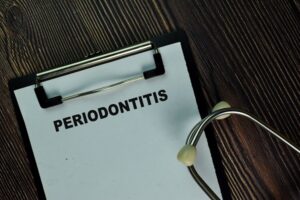Periodontitis is an inflammatory disorder that usually occurs secondary to periodontal disease. It is characterized by the progressive destruction of the periodontium. It is a common disease of the gums and is usually caused by microbial agents present in large accumulations of dental plaque in the oral cavity.
Periodontitis ranks high among the top threats to dental health today. It occurs more commonly in adults above the age of 65, and adults aged 30 years or older usually have some form of periodontal disease. It is also more common in men than in women, and smokers have a higher chance of developing periodontal disease. Chronic periodontitis can cause tooth loss, bone loss, and weakening of teeth.
Causes of Chronic Inflammatory Disease in Periodontal Disease
 Infection of oral tissue by bacteria causes periodontal disease. Bacteria accumulate on the teeth to form a film called plaque which can harden to form calculus. Calculus and the bacteria they contain can spread below the gum line and cause inflammation, which can progress to cause chronic inflammatory disease.
Infection of oral tissue by bacteria causes periodontal disease. Bacteria accumulate on the teeth to form a film called plaque which can harden to form calculus. Calculus and the bacteria they contain can spread below the gum line and cause inflammation, which can progress to cause chronic inflammatory disease.
Thus, chronic inflammatory periodontitis can occur due to long-standing periodontal disease. This makes it essential to have regular visits with your dentist Medford to clean and remove plaque to prevent periodontal disease formation.
Is Chronic Inflammatory Periodontitis A Failure To Resolve?
Chronic inflammatory periodontitis indicates a failure to resolve the inflammatory response as a result of microbial infection. It also indicates an ongoing effort by the body to eradicate the oral infection from periodontal disease.
Signs Of Chronic Inflammatory Periodontitis and Periodontal Disease
Some of the most common signs of Periodontal disease include:
- Persistent Halitosis ( Bad breath)
- Swollen or red gums
- Bleeding and tender gums
- Pain while chewing
- Sensitive teeth
- Pulling away gums from teeth
- Loosening of teeth
- Changes in the fit of partial dentures
Risk Factors For Periodontal Disease
Certain risk factors increase the likelihood of an individual developing periodontal disease. Such factors include:
- Smoking
- Diabetes
- Heredity
- Poor oral hygiene
- Misshaped teeth
- Underlying immunodeficiency conditions, e.g., AIDS
- Use of medications that cause dry mouth
- Ill-fitting dental bridges
- Female Hormonal Treatments
Treatments For Periodontitis and Periodontal Disease
A qualified periodontist, dental hygienist, or dentist performs treatment for periodontal disease. Treatment for periodontal disease aims to ensure that the teeth are thoroughly cleaned and that damage to the surrounding bone is prevented. To maximize the results from treatments, it is essential to adopt good daily oral care.
Treatments for periodontitis can either be surgical or non-surgical. Some non-surgical treatments for periodontitis include:
- Scaling: This treatment is done to remove calculus and bacteria accumulated on tooth surfaces and below the gum line. Lasers and ultrasound devices can be used during this procedure.
- Root planing: This treatment involves the removal of bacteria and bacterial by-products by smoothening the rough surface. Smoothening of teeth surface also discourages the buildup of bacteria.
- Antibiotics: Oral and topical antibiotics can be used to manage periodontitis. After using topical antibiotics, it might be necessary also to use oral antibiotics to eliminate any inflammation-causing bacteria.
In advanced or chronic periodontitis, treatment might require dental surgery. Some of the standard procedures include:
- Flap surgery: This involves lifting gum sections to expose the roots of the teeth for more effective scaling and planning. The underlying bone can also be restructured during this procedure before the gums are sutured back.
- Bone grafting: This procedure replaces sections of bone that may have been lost due to periodontitis. Bone to be grafted can be gotten from other parts of the body or produced synthetically.
- Soft tissue grafts: Your gumline recedes as the gum tissue is lost. Some of your damaged soft tissue may require reinforcement. This is usually accomplished by removing a tiny quantity of tissue from the palate or connecting tissue from another donor source to the damaged area. This can help prevent additional gum recession, hide exposed roots, and improve the appearance of your teeth.
However, one thing you must note is that chronic periodontitis can only be treated but cannot be cured. Proper and regular dental hygiene is required to maintain dental health and prevent periodontal disease.
It is essential to know the symptoms of periodontal disease to begin early treatment and prevent progression to chronic inflammatory periodontitis. If you are experiencing any of the symptoms of periodontitis or you would like to have a regular dental check-up, then consult your Medford dentist today.

